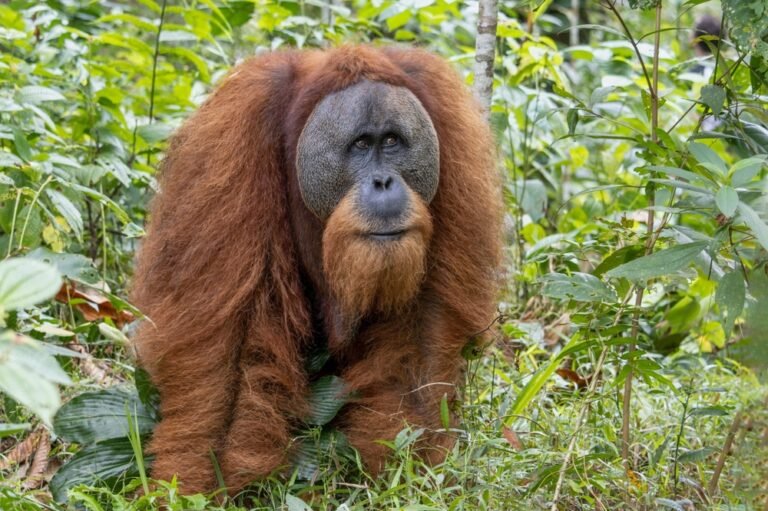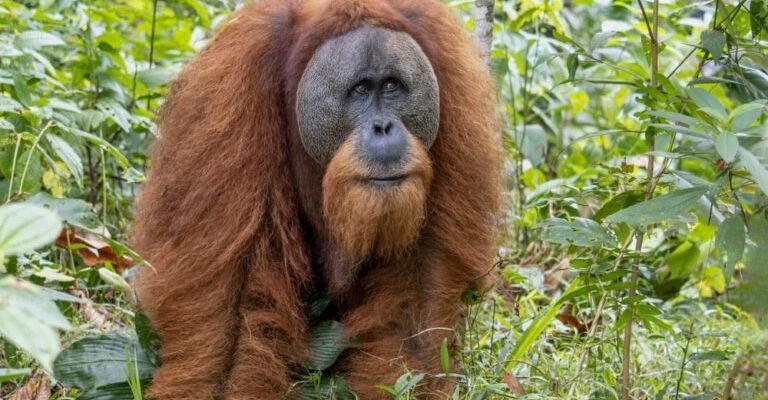
You might be wondering, what makes the Tapanuli orangutan special? Well, this species is not only rare but also holds the key to a balanced ecosystem. As they swing through the trees and munch on fruits, they help trees reproduce and maintain the forest’s structure. Think of them as the gardeners of the rainforest, shaping the world around them with their actions and habits. Now, let’s dive deeper into their important role in their ecosystem and explore what happens if they’re removed from the equation.
Understanding the Tapanuli Orangutan
The Tapanuli orangutan is one of the most endangered great apes, found only in a small region of North Sumatra. They are different from their Bornean and Sumatran relatives in several ways, including their genetics and behavioral traits. One of the most fascinating aspects of this species is their intelligence. Tapanuli orangutans are known to use tools, like sticks, to extract termites from tree bark or to crack open hard-shelled fruits. This ability not only showcases their problem-solving skills but also plays a role in the ecosystem by aiding in seed dispersal and maintaining plant diversity.
Their physical characteristics are just as remarkable. With long arms, strong hands, and a unique facial structure, these primates have adapted perfectly to their arboreal lifestyle. They spend most of their lives in trees, moving gracefully from branch to branch. This tree-dwelling habit is crucial for their survival and is tied to how they interact with their environment.
The Importance of a Healthy Ecosystem
So, why is a healthy ecosystem even important? Well, think of the ecosystem as a giant web. Every creature, plant, and microorganism plays a part in keeping that web intact. When one strand is damaged, the entire web can become weakened. This is true for the Tapanuli orangutan; their presence helps support various aspects of their rainforest home.
Forests are essential for countless reasons, including climate regulation, oxygen production, and habitat provision for many species. Healthy forests also provide natural resources for local communities, like food and medicine. The Tapanuli orangutan helps maintain this balance by promoting biodiversity through their feeding habits. As these primates consume fruits and leaves, they help spread seeds throughout their environment.
Without them, we could see a decline in certain plant species that rely on these animals for reproduction. As their ranges shrink due to human activities, we risk losing not only the orangutans but also a vital part of the forest ecosystem.
Seed Dispersal and Plant Diversity
Here’s the thing: when Tapanuli orangutans eat fruits, they don’t just munch and move on. They play a huge role in seed dispersal. After swallowing seeds, they travel through the forest, depositing these seeds in new locations. This process is crucial for forest regeneration and maintaining diversity among plant species.
Let’s imagine a simple scenario: if a Tapanuli orangutan eats a durian fruit and later defecates somewhere else in the forest, that seed has a chance to grow into a new durian tree. These new trees can provide food for other species, creating a cycle of life that supports the entire ecosystem. The more diverse the plant life, the healthier the forest is overall.
In contrast, without the orangutans, certain trees might decline, leading to fewer food sources for other creatures, including birds, insects, and even other mammals. The loss of just one species can create a domino effect in the ecosystem, altering the delicate balance that has developed over centuries.
Impact on Other Wildlife
The Tapanuli orangutan doesn’t just care for its own species; it impacts other wildlife around it. By helping maintain the health of the rainforest, these primates create a supportive habitat for many animals. Their activities can affect food availability and shelter for countless species.
For example, many birds depend on fruit from the trees that orangutans help disperse. If the trees decline, the birds lose their food source, potentially leading to declining populations. Similarly, other mammals, reptiles, and insects rely on a diverse ecosystem for survival, which is directly affected by the presence of the Tapanuli orangutans.
Furthermore, healthy ecosystems are often more resilient to diseases and climate changes. The more diverse the species present, the more robust the ecosystem can be against various threats. Tapanuli orangutans contribute to creating a richer environment, which can help buffer against these issues.
Threats Facing the Tapanuli Orangutan
Despite their importance, Tapanuli orangutans face numerous threats. Habitat destruction is perhaps the most significant issue, mainly due to logging and palm oil plantations. As more trees are cut down, these primates lose their homes and food sources. It’s like taking away the foundations of a house—the whole structure becomes unstable.
Additionally, they are also at risk from poaching and illegal wildlife trade. When individuals are taken from the wild, it threatens the genetic diversity of their population. This can lead to inbreeding and a weakened gene pool, making them more vulnerable to diseases and other environmental pressures.
Climate change is another looming concern. As temperatures rise, the habitats of these orangutans can shift or diminish, forcing them to move to new areas in search of food and shelter. But with limited space and resources, this can spell disaster for their survival.
Conservation Efforts and the Future
Thankfully, many conservation efforts are underway to protect the Tapanuli orangutan and its habitat. Organizations are working tirelessly to raise awareness about the importance of these primates and the ecosystems they support. Initiatives include habitat preservation, anti-poaching measures, and educational programs for local communities.
There’s also a growing movement to promote sustainable palm oil practices. By choosing products with certified sustainable palm oil, consumers can help reduce the impact on the orangutan’s habitat. Supporting eco-tourism initiatives in the region can also provide financial incentives for protecting the forest while benefiting local communities.
You might be wondering how you can help. Everyday choices, like being mindful of the products you buy, can contribute to conservation efforts. Spreading the word about the plight of the Tapanuli orangutan can also raise awareness and encourage others to act.
As we’ve explored, the Tapanuli orangutan plays a crucial role in its ecosystem, acting as a gardener, a seed disperser, and a key player in maintaining biodiversity. The health of their forest home closely ties to their presence, highlighting the interconnectedness of all living things.
By understanding and protecting the Tapanuli orangutan, we’re not just saving a species; we’re ensuring the health of an entire ecosystem. Our choices and actions can make a difference, whether it’s supporting conservation efforts or simply being aware of the impact of our consumption. Together, we can help preserve the beauty and balance of nature for generations to come.

